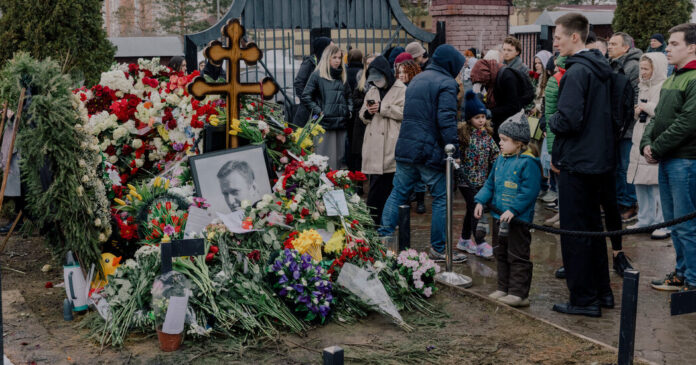The Russian authorities have attributed the death six months ago of Aleksei A. Navalny, the country’s main opposition leader, to a grab bag of diseases aggravated by heart arrhythmia, a conclusion described as preposterous by his widow on Thursday.
Mr. Navalny’s widow, Yulia Navalnaya, speaking in a recorded statement posted online, said she received a three-page document from Russia’s Investigative Committee last week saying there was no cause to open a criminal investigation into her husband’s death in a remote Arctic prison because a combination of medical factors had killed him.
“Here’s a man under constant surveillance in prison, a globally recognized politician, the leader of the opposition, and suddenly he dies within an hour from a ‘combined illness,’” Ms. Navalnaya said. “The report is a lie, and they are hiding what happened that day.”
She demanded that the authorities release the full medical report and return Mr. Navalny’s personal effects to his family, including his notebooks and the cross that he wore. The family has requested this material repeatedly, she said, but was told it would have to wait until the committee, the main agency for investigating possible federal crimes in Russia, completed its report.
Ms. Navalnaya said that she believed the real cause of death was murder by the state, and that in the absence of a credible official inquiry, which was unlikely as long as President Vladimir V. Putin remained in power, the family would conduct its own investigation, no matter how long it took. The Kremlin has strongly denied that it had Mr. Navalny killed.
At the time of Mr. Navalny’s death, on Feb. 16, Russia’s Federal Penitentiary Service said he had lost consciousness and died after taking a walk that day in the prison where he was moved to late last year. His death, at 47, stripped the Russian opposition of its most popular and charismatic leader, a man who had repeatedly embarrassed Mr. Putin with investigations into corruption rooted in the Kremlin.
After surviving an attempted assassination by poisoning in 2020, Mr. Navalny recuperated in Germany. He was arrested at passport control when he returned to Russia in early 2021 and transferred from one increasingly harsh penal colony to another as the court added more than 30 years to his sentence on various charges considered politically motivated.
In her statement, Ms. Navalnaya noted that her husband had been deemed medically well enough to be put into solitary confinement 27 times during those three years, and that no serious medical problems had been reported after what should have been a thorough physical when he was transferred to a new penal colony in December.
He had also appeared cheerful and animated in a court appearance via video link the day before he died, she noted, and had been deemed fit enough to walk outside in weather that hit minus 20 degrees Celsius.
Ms. Navalnaya accused the authorities of inventing the diagnosis of arrhythmia as a cover, and dismissed the list of diseases that the committee said her husband had as common without being fatal among one-third of Russian adults. She laid out a different sequence of events in his last moments from that in the document, although the source of her information was unclear.
The letter from the authorities said that when Mr. Navalny felt ill during his walk, he was taken immediately to the prison’s medical center. Both the medical staff and an emergency team summoned to help failed to revive him, it said.
But Ms. Navalnaya said that when Mr. Navalny felt ill, he was taken back to his cell and died there; and he was transferred to the medical unit only after he had lost consciousness. In the last minutes before he died, she said, he complained of an acute pain in his stomach, which was not mentioned in the official report.
Ms. Navalnaya said the authorities should release the surveillance footage from the prison, where all rooms are monitored around the clock.
The letter from the committee included a long list of diseases, including hypertension, chronic hepatitis and a damaged vertebrae, that it attributed to his death. It described the actual trigger as an increase in blood pressure that had disturbed his regular heart rhythm and overloaded his heart.
Dr. Alexander Polupan, one of Mr. Navalny’s former doctors who had helped resurrect him after he was poisoned, described the report as “implausible.” The authorities either failed to determine the cause of death or they found it but decided to hide it and wrote about arrhythmia, he said in a text message.
The disease is either congenital or can develop because of the structure of the heart, but neither had been diagnosed previously in Mr. Navalny’s case, he said, and there was no indication of hypertension in his earlier medical documents.
Milana Mazaeva contributed reporting.
Read More: Navalny’s Widow Disputes Russian Report on Her Husband’s Death


